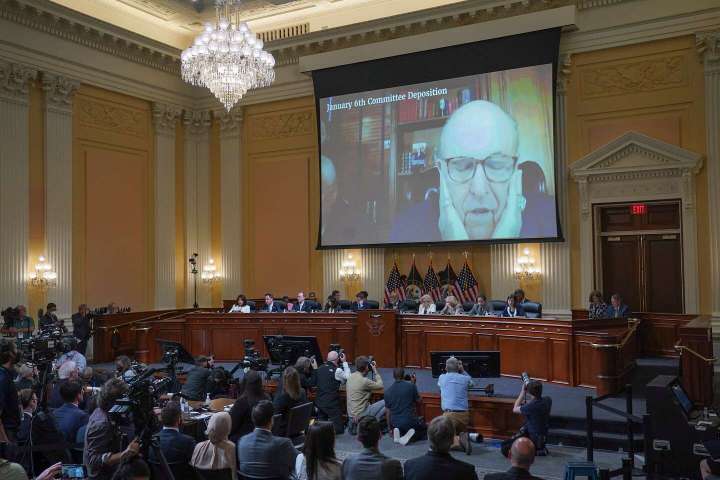Rudy Giuliani’s decision to wander into dicey legal arenas in recent years appears to have brought him closer than ever to being prosecuted, with news that he has been informed he is a target of the criminal probe being run by Fulton County, Ga., District Attorney Fani Willis.
Giuliani’s legal jeopardy in Georgia

Such a step is often a precursor to an indictment, and it’s been known for a few weeks that Willis’s probe was advancing rapidly and that she has focused extensively on Giuliani. This also appears to be the first time — that we know of, at least — that a top Trump ally has been named as a target of an criminal investigation related to efforts to overturn the 2020 election.
Giuliani has seen his law license suspended in New York state over the 2020 push and is being sued by voting-machine companies. But he has thus far avoided criminal charges for various controversies involving his lobbying, including vis-a-vis the Ukraine scandal. At one point last year, Giuliani was even served with a search warrant in that probe, but the New York Times reported recently that he’s unlikely to face indictment.
So why might Georgia be different?
In the dizzying array of Jan. 6-related investigations, it can be difficult to keep track of who did what and when. But what we know about Georgia is that Willis has taken a keen interest in the “fake electors” plot, in which Giuliani was a key player. We also know Giuliani held hearings in Georgia in 2020 that included multiple false claims which could be the subject of criminal charges, depending upon how aggressive Willis wants to be.
Willis has suggested her investigation might result in charges that include racketeering and conspiracy — effectively a coordinated effort to fraudulently overturn the election — and Giuliani could also be vulnerable to charges of making false statements in those hearings.
Willis has gestured in the former direction, in particular. In a petition last month seeking testimony from Giuliani and other aides to Donald Trump, Willis cited Giuliani’s hearings as being “part of a multistate, coordinated plan by the Trump Campaign to influence the results of the November 2020 election in Georgia and elsewhere.”
A key part of that coordinated plan appears to be the fake-elector plot. Several states named slates of alternate electors for Trump, ostensibly for a scenario in which the state’s election results were ultimately overturned by a court or the state legislatures. But then, even without action from the courts or state legislatures, Trump and top allies tried to get Vice President Mike Pence to overturn the election with the fake electors anyway. And there is some evidence that certain people involved in the fake-electors plot might have understood it to be more than just a contingency — and thought that the fake electors could be used on Jan. 6 regardless.
Willis last month informed the 16 fake electors that they were also targets of her investigation. Those fake electors have in turn stated in court that they were unaware of an effort to use them absent the results being overturned in the state — a reflection of the legal jeopardy involved in what became of the Jan. 6 plot.
As for Giuliani’s involvement in the fake electors, Willis has said in a petition that he worked with pro-Trump attorney Kenneth Chesebro to coordinate the fake electors.
Beyond that, there’s the possibility that Giuliani could be held liable for making false statements in those hearings. Across many hours, Giuliani offered a litany of bogus claims, including some which had already been debunked. He claimed, for instance, that lots of underage voters, dead people and felons had voted in Georgia (none of which are true), and he blamed voting machines for changing the results (which also isn’t true and has earned Giuliani problems in civil court).
Giuliani’s many false statements in Georgia were a particular focus of a report issued by an appeals court in New York last year in suspending his law license.
“Respondent repeated to lawmakers and the public at large numerous false and misleading statements regarding the Georgia presidential election results,” the appeals court said. “These statements … were all knowingly made with the object of casting doubt on the accuracy of the vote.”
Georgia has a law against making “a false, fictitious, or fraudulent statement or representation … in any matter within the jurisdiction of any department or agency of state government.” Violations can carry sentences of between one and five years in prison.






